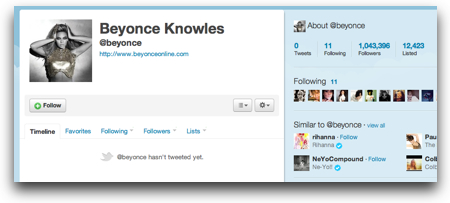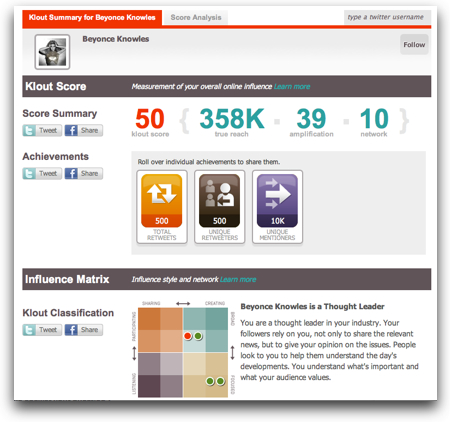 I have a friend who checks his Klout Score religiously. Daily… in fact… multiple times per day[1]. As a poster boy for Klout’s marketing, he wants to “get more Klout” and is perplexed by my lukewarm reaction when he brings it up, particularly given that I have a decent Klout score that is much higher than his.
I have a friend who checks his Klout Score religiously. Daily… in fact… multiple times per day[1]. As a poster boy for Klout’s marketing, he wants to “get more Klout” and is perplexed by my lukewarm reaction when he brings it up, particularly given that I have a decent Klout score that is much higher than his.
The reason for my reticence is basically this:
Klout scores are useful, but very definitely imperfect.
Despite Klout’s bold marketing that they are “the Standard for Influence”, the reality is that they are simply one metric that can be taken into account when trying to determine how influential a certain person is online. They are not the end-all and be-all… the ultimate arbiter… etc., etc.
Just one metric.
Beyonce???
A case study in the imperfection of Klout’s system would be the Twitter account allegedly for singer Beyonce Knowles: @beyonce. The account currently has over a million followers… and a Klout score of 50. (Klout scores are based on a scale of 0 to 100.) Here’s the chart:
Notice that the account is indicated to be a “Thought Leader”:
You are a thought leader in your industry. Your followers rely on you, not only to share the relevant news, but to give your opinion on the issues. People look to you to help them understand the day’s developments. You understand what’s important and what your audience values.
But here’s the thing….
the Beyonce Twitter account HAS NOT SENT OUT A SINGLE TWEET!
Zero. Zip. Nada. Zilch. None.

And yet somehow this account has a Klout score of “50”? With a badge saying that it had “500 Total Retweets”? (HUH? How do you do a retweet when there are no tweets?)
Proponents of Klout may of course say that this shows the influence Beyonce would have should she decide to start tweeting. And sure… with 1 million followers, this account certainly could have some influence. And yes, perhaps this is just an “edge case” … but still, it is an example to me of why obsession over the metric isn’t helpful.
Technorati Authority, Redux
You see, we’ve seen this movie before. Those of us who have been around the blogging world for a while (coming up on 11 years for me) remember well the “Authority” ranking established by Technorati in its earlier years. It aimed to show how well your blog ranked in the millions of blogs out there. People tracked their Technorati Authority ranking religiously… they added buttons and widgets to their blogs… people wrote blog posts and had conference sessions about what you could do to increase your Technorati Authority… people stressed out when their Authority ranking dropped. It was all quite the rage.
And just like the Klout score, it was an imperfect tool… as were all the other metrics/indices/etc. that popped up trying to be the next best measurement of influence.
Technorati Authority was useful, but it was just one more metric to consider.
And IS it Beyonce?
Just to continue with the example a moment more:
How do we know that this IS Beyonce?
Anyone can create a Twitter account at any name. Anyone can put whatever name they want in a profile. Anyone can upload whatever image they want for their Twitter account. Anyone can put whatever URL they want into the “Bio” field of a Twitter account.
This “@beyonce” account is not a “Verified Account”. It very well could be Beyonce or one of her entourage setting this account up for future use. Or it could be a bored 13-year-old who noticed the account was available and is now sitting in his or her room laughing their ass off at how many people they suckered into following the account[2].
We have no way of knowing… particularly when the account isn’t tweeting.
The Klout score is for the Twitter account, which may or may not be the actual person named by the account.
Measuring Online Influence Is Insanely Difficult
If it were easy, we’d have simple metrics we could all agree upon.
Say you have User1 with 1,000,000 followers and User2 with only 100 followers… but what is missing is that in User2’s 100 followers are the heads of state for most of the countries of the world… and the heads of the largest corporations in the world. And that User1 has a high proportion of “spam” accounts.
Who has more “influence”? And is that online or offline influence?
Not easy questions to sort through… and ultimately bound by a certain degree of subjectivity. Which is why services like Klout, PeerIndex and others that are popping up all do provide a matrix of other indicators to provide more detail behind a “score”. Klout has “true reach, amplification, network” and a comparison matrix. Peer Index has “authority, activity, audience” and their own charts and matrices.
Of course, so often those additional indicators get lost in the desire for a simple “score” that you can use to sort people into different buckets of influence. (How many of you know your Klout Score but don’t remember the other numbers?)
Don’t get me wrong… the scores from Klout, PeerIndex, etc. are very definitely useful metrics… they can help us quickly understand whether the person screaming about our company online is someone with a large audience. Or they can help us identify people online that we may want to be following or targeting.
But they are just one more metric to be considered. And they are not perfect.
P.S. Hat tip to Anil Dash for tweeting that the Beyonce account was the first he knew of to hit 1 million followers without sending out a tweet, which is how I learned of the account.
[1] Which doesn’t make much sense to me given that my understanding is that Klout only updates their scores once a day.
[2] A separate blog post could be written about how Twitter’s encouraging people to follow various accounts may wind up recommending an account like this one with 0 tweets to a good number of people who may inadvertently click the “Follow” link without realizing that the account had never tweeted.
If you found this post interesting or useful, please consider either:

That’s great Dan – I’ve often had the same feelings about the service. 500RT’s gave me a good laugh.
Reminded me of this piece I read a couple of months ago about frequency of tweets apparently pushing up klout scores (maybe your buddy should just run a bot?.
http://www.wewillraakyou.com/2010/12/klout-is-broken/
Interestingly, I have no idea if a Klout score of 50 is good or bad 🙂
Thanks for the comment and the link to that post – interesting reading! I see that a similar post was also published relating to PeerIndex: http://www.wewillraakyou.com/2010/12/peerindex-twitter-spam/
It’s definitely a challenge to come up with a ranking like this… it will be interesting to see how the space evolves over the next while.
Ha! I will update the post with that info. Klout uses a scale of 0 to 100. (Although the only one I am aware of who has a Klout score of 100 is teen superstar Justin Bieber.)
I would personally say that a Klout score of 50 is pretty good.
Dan: this is a great read and very relevant! i think klout has done a superb job of marketing itself as the de facto standard of online influence – perhaps too good a job – because the reality is that the challenges inherent to calculating influence are huge. (problems like the one you highlight make me significantly doubt my own klout score, and that’s on top of my concerns about how klout lists people i haven’t interacted with in months as my influencers.) “influence” is only useful in the context of a particular strategy, so to rely on only one algorithm (without necessarily understanding if it places the most value on the same attributes you do) seems foolish: what one organization may need from an influencer is likely susbtantially different from what others need, so when i use other’s tools to try to evalute influence i try to weigh data from numerous sources (including klout) such as: http://www.peerindex.net, http://twittergrader.com, http://www.terametric.com, http://twitalyzer.com and http://tweetlevel.edelman.com
thanks again for the thoughtful piece!
PING:
TITLE: Sorry, Klout, But I Don’t Care At All About Your “Game”!
BLOG NAME: Disruptive Conversations
In one image, this is perhaps what annoys me most about Klout’s Klout Score metric: Yes, even more than the fact that Beyonce can have a Klout Score of 50 without ever having tweeted (or even knowing if that Twitter…
PING:
TITLE: My Top 9 Disruptive Conversations Blog Posts For Q1 2011 (They aren’t all from 2011)
BLOG NAME: Disruptive Conversations
With the end of a quarter of the year, I’m always intrigued to look back through Google Analytics and see what were really the top posts that people visited here on Disruptive Conversations. No matter what I may think are…
PING:
TITLE: Breaking News: MediaSift (makers of TweetMeme) Licenses Twitter Firehose to Merge With Klout And Sentiment Data
BLOG NAME: Disruptive Conversations
Moments ago at the Data 2.0 Conference in San Francisco, representatives of Twitter and MediaSift (the people behind Tweetmeme) stood onstage to announce that MediaSift is licensing Twitter’s “firehose” to provide a way to obtain filtered feeds from th…